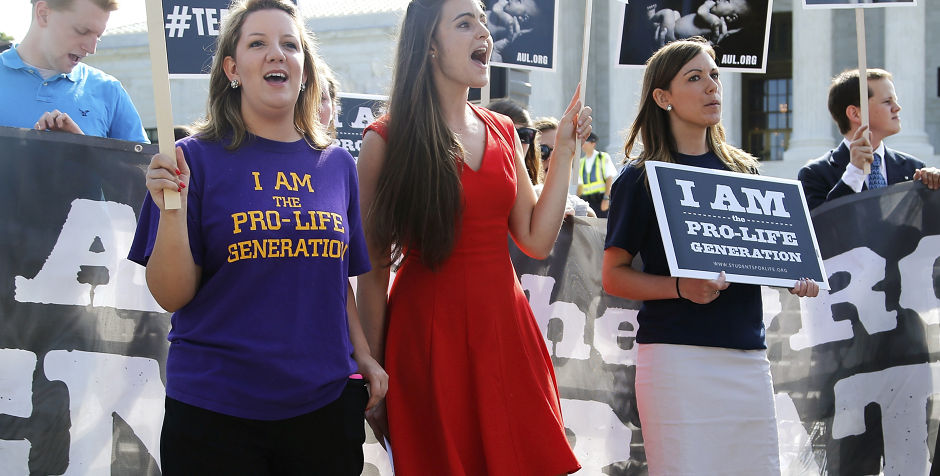Defending Pro-Life Speech in New Jersey
In the world of real estate, the mantra “Location, Location, Location” sums up the reality that the location of a property is one of the biggest factors that determine its desirability. The same principle applies with equal, if not greater, force when it comes to exercising the freedom of speech, including opposition to abortion.
While the growth of communications technology has made it easier for like-minded individuals to share information, more traditional methods of communicating like using public sidewalks and parks for protests, distributing literature, holding a sign, or in-person conversations often provide the most effective way to reach people who do not already agree with the speaker.
The Supreme Court commented on this fact in McCullen v. Coakley:
It is no accident that public streets and sidewalks have developed as venues for the exchange of ideas. Even today, they remain one of the few places where a speaker can be confident that he is not simply preaching to the choir. With respect to other means of communication, an individual confronted with an uncomfortable message can always turn the page, change the channel, or leave the Web site. Not so on public streets and sidewalks. There, a listener often encounters speech he might otherwise tune out. . . . [T]his aspect of traditional public fora is a virtue, not a vice.
In McCullen, the Court unanimously invalidated a law restricting the ability of individuals to speak on public sidewalks located near abortion clinics, noting that the law robbed pro-life sidewalk counselors, who desire to engage in friendly, conversational discussions with women heading to or from clinics, of their ability to do so.
McCullen, and subsequent lawsuits protecting the right to use public sidewalks near abortion clinics for free speech, have taken on added importance in light of the recent disturbing revelations that abortion clinics are selling the body parts of aborted babies. Abortion clinics, and their supporters within the ranks of the government, would prefer to eliminate the ability of pro-life individuals to discuss these issues with women in the critical moments that they approach abortion clinics.
After the City of Englewood, New Jersey enacted an ordinance similar to the one invalidated in McCullen, the ACLJ filed suit on behalf of Jeryl Turco, a Christian sidewalk counselor who has regularly used the public sidewalk in front of an abortion clinic to speak with individuals heading to or from the clinic.
The sidewalk presents Jeryl with her only opportunity to communicate with women who are considering having an abortion at the clinic. She has only a matter of seconds to encourage women to stop and speak with her further while pro-abortion advocates (acting as “clinic escorts”) do everything possible to interfere with her, so being banned from several hundred square feet of sidewalk near the clinic has tangibly harmed Jeryl’s ability to communicate.
We recently filed a motion for a preliminary injunction, which would allow Jeryl to resume using the sidewalk for her First Amendment-protected activities while the case moves forward.
There is a mountain of evidence demonstrating that Englewood’s goal was to significantly interfere with the ability of pro-life individuals, like Jeryl, to engage in First Amendment-protected speech on the sidewalk while leaving the activities of pro-abortion escorts untouched. For example,
- The City Council member who spearheaded the effort to pass the ordinance admitted that her goal was to “curtail the protestors” and to “cut down on the number of encounters between protestors and companion[s].”
- When the City Council member learned that the escorts had ordered vests that say, “Clinic Escort Volunteer,” she said, “Great—that should make it easier for the police to treat you differently.”
- The City’s police chief told the City Council that the pro-life speakers outside the clinic “do not block the sidewalk.” In fact, the ordinance at issue removed existing city code provisions that made it illegal to interfere with, obstruct, or impede entry to or exit from an abortion clinic.
- During the previous five years, the City has not made a single arrest, or prosecuted a single individual, for any alleged violations of law for activities conducted on the public sidewalk in front of the abortion clinic.
- The ordinance has an exemption for employees or agents of abortion clinics, and since the ordinance was enacted, multiple clinic escorts have routinely used the restricted sidewalk areas to express their viewpoints concerning abortion, including through speech and activities specifically designed to counter, and drown out, pro-life expression.
As the Supreme Court famously observed more than 70 years ago, “[t]he very purpose of a Bill of Rights was to withdraw certain subjects from the vicissitudes of political controversy, to place them beyond the reach of majorities and officials, and to establish them as legal principles to be applied by the courts. One’s right to life, liberty, and property, to free speech, a free press, freedom of worship and assembly, and other fundamental rights may not be submitted to vote; they depend on the outcome of no elections.”
The right to be free from unnecessary, overly broad, or viewpoint discriminatory restrictions on the use of public sidewalks near abortion clinics is a fundamental right protected by the First Amendment, even in parts of the country where local officials may desire to give special access to abortion supporters while “curtail[ing]” pro-life speakers by “cut[ting] down on the number of encounters” they can have with individuals who are considering having an abortion.
We will keep you informed as this case moves forward.

